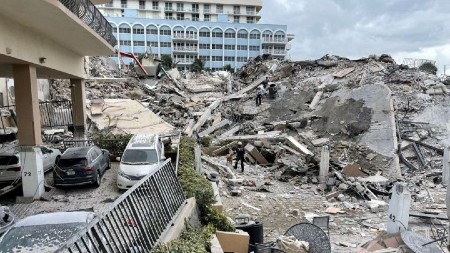WASHINGTON, D.C. – The director of the Pan American Health Organization (PAHO) Director, Dr. Carissa F. Etienne, Wednesday said that health facilities in at least three departments in Haiti are overwhelmed following the powerful magnitude 7.2 earthquake last Saturday that killed more than 2,000 people and left thousands of others injured and missing and feared dead.
 Destruction in HaitiShe has called on the international community to meet the country’s “immense” need for medical personnel, supplies, equipment, and patient transportation.
Destruction in HaitiShe has called on the international community to meet the country’s “immense” need for medical personnel, supplies, equipment, and patient transportation.
“In total 24 health facilities suffered damage, mainly first level of care,” she told reporters at her virtual weekly media briefing.
“In Grand’Anse, three health facilities were destroyed and two were damaged. In Nippes, we found that one health facility was destroyed and four damaged, and in Sud Department, 14 health facilities have been damaged.
“Our staff is being deployed to the Grand’Anse and Nippes departments to support reestablishing health services at departmental levels,” she said, referring to areas near the epicenter of the 7.2-magnitude earthquake.
In addition to supporting Haiti’s Ministry of Health and Population, PAHO has delivered essential medicines and other medical and surgical supplies for distribution to health institutions in need.
The Dominican-born PAHO official called on the global community to meet the “urgent health needs” identified by the health ministry.
“What we need is health personnel, supplies and equipment to treat patients with trauma, injuries, acute illnesses, chronic diseases and mental issues,.
“There is an urgent need to restore health services mainly in the most affected areas and to ensure adequate water and sanitation to prevent increases of diarrheal, respiratory, and skin diseases.
“Our hearts go out to the people of Haiti, and rest assured that we are doing everything possible to assist Haitians in these difficult and hard times. Our priority is to support the operation of health services and help save people’s lives,” Dr. Etienne told reporters.
She also took the opportunity to send her condolences to the family and loved ones of PAHO’s international consultant and public health emergencies specialist, Dr. Ousmane Touré, who had been supporting the organization’s COVID-19 response in Haiti since July.
“Dr. Touré’s loss is emblematic of the dangers health workers face and the extraordinary sacrifices they have made during this pandemic,” she said.
Regarding the coronavirus (COVID-19) pandemic, Dr. Etienne said recently collected data reveals a “mental health crisis” in the Americas.
She said more people are suffering substantially added mental health problems at a time when services for them are also disrupted because of the sweep of the disease.
“Today we are facing a mental health crisis that, if left unaddressed, will have severe consequences. It will not only worsen the mental health burden in our region but also prolong the pandemic’s impact,” she warned, urging countries to increase investment in mental health programs and called attention to three countries – Chile, Trinidad and Tobago, and Costa Rica – that are successfully doing so.
Addressing the pandemic’s toll in terms of illness and mortality, Dr. Etienne reported 1.4 million COVID-19 cases and nearly 20,000 deaths in the Americas in the past week.
In South America, most countries are experiencing declining cases, she said. Across Brazil, hospital occupancy is lower than 80% across all states for the first time since November. But elsewhere, cases are on the rise.
Fueled by the Delta variant, COVID infections are accelerating across North America.
“In Mexico, more than two thirds of states have been deemed at “high” or “critical” risk as hospitals fill with COVID patients,” she said.
Both cases and deaths are reportedly rising in Central America, particularly in Costa Rica and Belize. Infections and deaths are increasing across the Caribbean, including in Cuba. Dominica, Guadalupe, Jamaica, Martinique, and Puerto Rico, where cases rose by 49 per cent and deaths increased by 70 per cent. In Trinidad and Tobago, weekly deaths continued to rise,” PAHO added.


